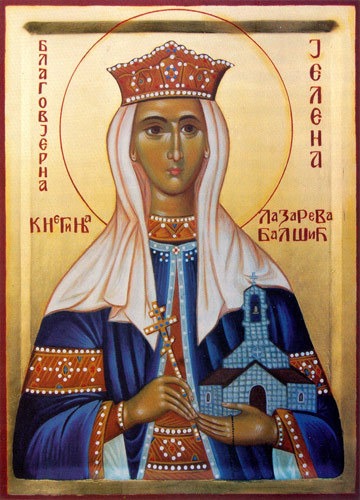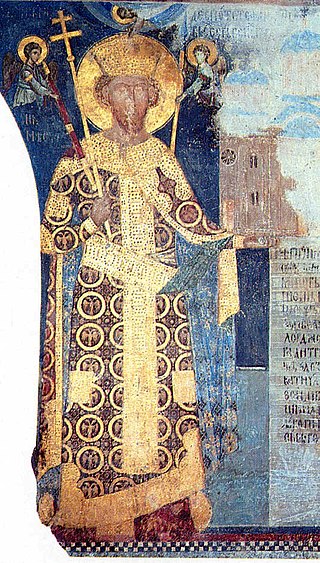OUR BLOG
JELENA BALŠIĆ
SERBIAN DIPLOMATS
 Фото: https://carsija.rs/pravoslavna-crkva-danas-slavi-svetu-jelenu-balsic/
Фото: https://carsija.rs/pravoslavna-crkva-danas-slavi-svetu-jelenu-balsic/
At the age of less than 20, in 1386, Jelena married the much older Đurđe Stracimirović Balšić, lord of Zeta and Upper Albania, and with him she had an only son, Balša III. With that marriage, Đurađ established family ties with the ruling family after the death of Emperor Dušan the Strong and the collapse of the Serbian Empire.
At the court of Balšić, Jelena dedicated herself to taking care of the family as well as building and restoring Orthodox churches, especially in the area of Bar and Ulcinj, although her husband also trusted her with diplomatic affairs.
Remains of the Old Town in Bar
The Battle of Kosovo and the death of her father, as well as the slavery of her husband Đurađ who was captured by the Turks, are just some of the tragic events that marked the life of this noblewoman.
In addition to the great treasure, Đurađ the Second also gave the cities of Skadar and Lješ for redemption from Turkish slavery, which he would later win back in battles, but then cede them to the Republic of Venice for a commission of ducats per year.
After the death of her husband in 1403, Jelena took over the management of the country. She decided to help her then-minor son Balsha in managing the country, renouncing the monastic life characteristic of many widows after the Battle of Kosovo. She were decorated with combativeness and determination, energy and wisdom. Her reign was marked by war against Venice (1405–1409), because she wanted to return the cities of Skadar and Drivast, which were ceded to Venice by Đurađ, under the auspices of Zeta.
At the beginning of 1404, she convened a land assembly in Bar, and she addressed the assembly with the words: “I place my son Balša on this throne because he is the heir of his father, the heir of the famous name of Balšić, and the first of your and my master.” But until he comes of age, I will help him manage the country.”
She also proposed to annul the contract by which Shkodër joined the Republic of Venice and to return to Zeta either peacefully or by fighting, for which the Parliament gave her strong support.
However, the negotiations with the Venetians did not succeed, so after a seven-year siege, her army occupied Skadar, but in the following year, the Venetians conquered Ulcinj, Bar, and Budva, which Stefan Lazavić her brother warned.
Despot Stefan Lazarević
As the Venetians invited Balša to negotiations, the distrustful Jelena went on a diplomatic mission by herself. She traveled by warship to meet with Doge Mihail Sten, managing to make peace by taking all the blame for the rebellion against the Venetians on herself.
However, the Venetians still did not adhere to the agreement, and Jelena was forced to regain her lost territories through war.
She remarried in 1411 to the Bosnian Grand Duke Sandalj Hranić, lord of Hum, with whom she had no children. By marrying the Bosnian duke, who was once Balša’s fiercest opponent, she enabled her son not only to preserve the existing territories but also to protect himself from possible attacks by the Venetians. With the help of his powerful stepfather, Balša ratified a peace treaty with the Venetians in 1413 and returned the lost territories.
But the peace did not last long. The Venetians recaptured Budva and some other parts of Zeta, and Balša, already in poor health, went to Serbia to seek help from the despot Stefan Lazarevic. However, aware that he would soon die, he then transferred all his state rights to the uncle. In April 1421, Balša died in Belgrade, where he was buried.
The despot manages to reconcile the Venetian senate with his sister Jelena, who at that time was widowed for the second time.
Then she turned to the spiritual life, and in 1440, three years before her death, on Lake Skadar, on the island of Beška, Jelena built the church of the Holy Mother of God, which will be in her possession.
Endowment of Jelena Balšić
She spent the last years of her life in this endowment, being interested in monasticism and studying religious literature. He found his peace in his correspondence with his priest and confessor Nikon of Jerusalem, and her letters and his answers represent the most beautiful prayer pages of Serbian medieval poetry. They are found in the Gorica Collection, which today is kept in the Archive of the Serbian Academy of Sciences and Arts.
She died in 1443, and in the same year, Bar (once the throne place of her son) for the third time fell into the hands of the Venetians, who held it for the next 128 years, until the Turkish conquest.










 2018
2018